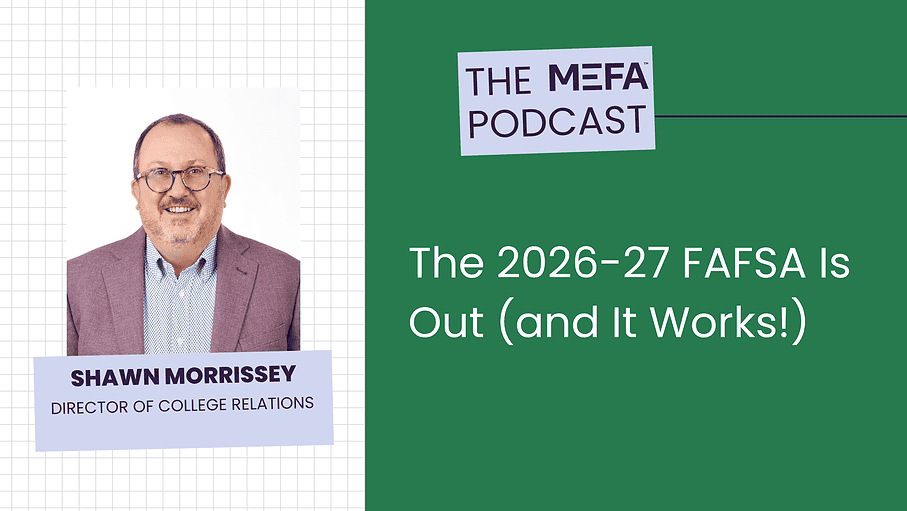Resources Mentioned in this Episode
Please note that this transcript was auto-generated. We apologize for any minor errors in spelling or grammar.
Shawn Morrissey: [00:00:00] Yeah, so it’s been a rocky few years with the FAFSA, but with good intention. So there was legislation that required FAFSA simplification, which they wanted to really cut down the number of questions that were being asked on the FAFSA. However, it was a little bit of a bumpy ride because there were a lot of things that had to be done within a quick time period to try to get.
This FAFSA simplification out to the public in a timely manner. So they had certain deadlines that they had to meet in order for this to happen, and so the first couple of years of this rolling out weren’t as smooth as they had hoped for the process. The good news is. They’ve [00:01:00] really figured out all of the problems for this year, and we’re hearing great things about the FAFSA and how quick it is for families this year.
Jonathan Hughes: Hi everyone, and welcome to the MEFA Podcast. My name is Jonathan Hughes, and you just heard from our guest on the show today, MEFA’s, Director of College Relations, Shawn Morrissey. Today is our FAFSA episode, our annual FAFSA episode, because this is the beginning of October and when the FAFSA comes online for any students who are going to be applying to colleges this year to attend next year.
And so of course, every year there are questions about the FAFSA. In recent years, there’s been many questions about the FAFSA. But this year I think folks are in for a pleasant surprise when it comes to the FAFSA. It’s a very positive topic for the first time in a few years about how easy it is to file the FAFSA.
But that’s not to say that there aren’t things to discuss and tips to give you [00:02:00] on how best to file your FAFSA. And Shawn is our expert in doing that. So let’s not waste any further time and get right to our show. I’ll be back to wrap things up, but until then, let’s meet our guest.
Shawn Morrissey: Hi, I am Shawn Morrissey. I’m Director of College Relations at MEFA. I’ve been at MEFA for three years now. Before that, I have about 30 years of experience working in the financial aid area.
Jonathan Hughes: Yes. And you are, I think one of, if not the FAFSA experts in MEFA internally, would I consider you to be at least? Whenever makes sure, yeah, whenever we do a FAFSA show, so we got to have Shawn on to talk about the FAFSA and so it, this is the time of year, right?
It’s coming up or it’s actually here. Yeah so if we can back all the way up, it just, anybody’s unaware about or they’ve heard of the FAFSA, they’re not quite sure. Can you just tell everybody what is the FAFSA and why is it important?
Shawn Morrissey: So the FAFSA stands for Free [00:03:00] Application for Federal Student Aid. It is the national application for financial aid that’s required at all colleges and universities in order to apply for financial aid.
Jonathan Hughes: And so filing the FAFSA makes you eligible for aid from who?
Shawn Morrissey: It makes you eligible for aid from the federal government from state agencies, and some colleges use that as well for their institutional aid as well.
Some schools may require an additional application on top of the FAFSA for their institutional aid. Others will only require the FAFSA, but every school does require the FAFSA, even if they have additional applications as well.
Jonathan Hughes: Yeah. So it’s a, so it’s a big deal. And if you could just say, because it’s been a whole sort of saga with the FAFSA in recent years. Can you just let everyone know what’s been going on with it up until this point is from, I’d say oh three or so years ago.
Shawn Morrissey: Yeah. So it’s been. A [00:04:00] rocky few years with the FAFSA, but with good intention. So there was legislation that required FAFSA simplification, which they wanted to really cut down the number of questions that were being asked.
On the FAFSA along with that, there was separate legislation which allowed the IRS to share data directly to the FAFSA for families so that families wouldn’t have to manually enter any tax information on the FAFSA. And that really helped with the FAFSA simplification process. However, it was a little bit of a bumpy ride. Because there were a lot of things that had to be done within a quick time period to try to get this FAFSA simplification out to the public in a timely manner. So they had certain deadlines that they had to meet in order for this to happen. And so the first couple of years of this rolling out weren’t as smooth as they had [00:05:00] hoped for the process.
The good news is they’ve really. Figured out all of the problems for this year and we’re hearing great things about the FAFSA and how quick it is for families this year. But the big changes really were to get the information shared directly from the IRS and to. There’s also a lot of skip logic being used so that if a family doesn’t have to answer a question, the family’s not even presented with that question. So it, it just can move them quickly through the process.
Jonathan Hughes: Yeah. And so when we were talking about doing the show, you already alluded to, but when we were talking about doing the show and I said what should we do? The show about the FAFSA this year? It’s a nice answer you had, which was what?
Shawn Morrissey: That it’s really. Working well now in that they’ve made some really great train changes for this year, which we’ll talk about in a few minutes. That [00:06:00] makes the process really simple for families. And I think the record for filling out a FAFSA I heard was actually under a minute. I heard that too. That’s not the experience for most families, but for most families it’s been 10 minutes or under.
So it’s really a quick process. I think the. Official estimate is about half an hour that it will take families, but for most families it’s been well under that.
Jonathan Hughes: Yeah. So can you give me then just a high level explanation of how the FAFSA has been able to correct itself or iron out the issues that have been present in the past couple of years? What do they do and who does this?
Shawn Morrissey: So this is all done by Federal Student Aid. They’re the ones that are heading, that are in charge of the whole process of the FAFSA. And so they have a team they’re federal employees that develop all of the way that [00:07:00] this works.
But what they’ve really done this year because a lot of where families were having issues in the past couple of years, and it’s, it was all over the press. Is that. Families weren’t able to match up a student’s FAFSA and parents that were required on the FAFSA, their information, and they’ve really streamlined that process this year. It makes that a lot easier.
Jonathan Hughes: Yeah, take me through that a little bit. So what do you mean by that? And then where was the hangup?
Shawn Morrissey: Yeah, so what. What happens is when a student files the FAFSA, they’re asked a series of questions which determines if they are considered a dependent or an independent student. And for the most part, a student is considered dependent if they’re under 24, if they don’t already have a bachelor’s degree, they’re not married, they’re not a veteran. Not a ward of the court, then they’re considered a dependent student and [00:08:00] they’ll have to list one or more parents on their FAFSA.
And how the process worked in prior years was you would have to put. The parents’ name, social security number, email address, and physical address. In order for that to be matched up with the parents’ information that they had signed up for when they created what’s called an FSA ID or an account on studentaid.gov. If that information did not match exactly, then there were problems connecting that student FAFSA with the parent that was invited.
Jonathan Hughes: I do remember this now.
Shawn Morrissey: Yes. So it, it became a real problem for students that were just making, not even mistakes, but would add like an additional space in the address or put a hyphen in the last name where there isn’t a hyphen on the information that was put [00:09:00] on the F-S-A-I-D.
Things like that would just make it really hard for families to match up their. Student and parent information. This year, they’ve streamlined that process where all a student has to provide is the parent’s email address. And it doesn’t need to even be the email address that the parent used if they had already set up an F-S-A-I-D.
So it could just be any email address that parent has access to. And then the parent is just given a code via that email that they fill in that then connects the student. And the parent and the student always has access to that code as well. So if the parent loses the email or anything like that, the student can go back onto their FAFSA, see that code, and share that with the parent as well. So it really streamlines that process of matching up the parent and the student.
Jonathan Hughes: So is this why, [00:10:00] and I know one of the big pieces of advice this year has been for students to begin the FAFSA first.
Shawn Morrissey: Yes, and the reason that the advice is for the student to begin the process first is this matching process only works if the student begins the FAFSA process.
If a parent goes in and they have the option of starting the process as the parent. Then it goes back to that old matching process where it has to match all of the information in order for it to work. So it’s much more streamlined if you start the process as the student.
Jonathan Hughes: I understand that now. That makes so much sense. Okay, thank you. Now in addition to that, which is a process change, ha has there been, because most years there are some, sometimes big, sometimes small changes to the FAFSA itself, like maybe some of the questions or how something has countered. Is there anything like that this year?
Shawn Morrissey: There are a couple of questions that have changed a little bit, part of the formula [00:11:00] change for FAFSA simplification in the last couple of years, they, there used to be an exclusion for small businesses in farms were not included as assets in the past. And then with FAFSA simplification, they were included. Now they’ve been excluded again. So when you’re reporting information about your assets.
You can exclude a small business, which means if there’s a hundred or less employees or a family farm. So if the family lives on the farm you don’t have to include the business value of that farm. And they’ve also added onto that commercial fishing businesses that are excluded from being considered an asset.
Jonathan Hughes: Yeah, I did notice that commercial fisheries.
Shawn Morrissey: So those are the, there’s really haven’t been a lot of other changes to the form itself, but there is one other really big, exciting change is that in the past it was recommended that a family starts. Getting themselves an [00:12:00] F-S-A-I-D three to five business days before starting the FAFSA because it had to go through a Social Security administration match for those with a social security number, and it would take three to five days for that to be completed in order for them to have a valid F-S-A-I-D that would pull.
All of that IRS data into the FAFSA. Now that Social Security administration match happens in real time when you’re creating your FSA ID. So there’s no longer a wait period for families to have to go through in order to use their FSA ID to complete the FAFSA. So you can go in, in one sitting create yourself an FSA ID, which is just the username and password for completing a FAFSA and all else that is on studentaid.gov. So it’s just a username or password. They call it an F-S-A-I-D, but you can go in, create that the same time and immediately use that in order to [00:13:00] fill out the FAFSA. So when I was talking about that. Email that goes to the parent with the code in there.
They can then go follow that link. It’s going to bring them to studentaid.gov. If they don’t already have an FSA ID, they can just click create an account and create their account right then and there. If they have a social security number, it’s going to match them. With the Social Security Administration in real time, and then they’re ready to go and use that to finish completing the FAFSA.
They don’t have to wait at all anymore. For those that. Contributors parents that don’t have a social security number. There is a process for them as well to create an FSA id. But it’s going to bring them through a process where they have to answer knowledge based questions from their credit report.
If they answer those correctly, then their F-S-A-I-D is validated and ready to use right away. If for any reason they’re not able [00:14:00] to answer those questions, they can still use their F-S-A-I-D and go through the entire process of the FAFSA, but they’ll be asked by the schools that they are applying to, to just give some additional information to verify their identity before they can actually receive any of their federal aid.
Jonathan Hughes: Oh, wow. I didn’t know that. I thought if if parents didn’t have a social security number, then it would just default to taking a few days to get your FSA ID.
Shawn Morrissey: No. They can use it right away. But they’re going to have to do some follow up with the school later on.
Jonathan Hughes: Wow, that is a huge improvement. So everybody can just get it all done in one stop. Now I want to ask a question that has come into now, because we were talking about this internally because it’s so easy to file a FAFSA. Maybe we haven’t been getting as many technical questions on filing the FAFSA, or how do I answer this question on the FAFSA questions?
But we still get questions surrounding filing the FAFSA and about financial aid [00:15:00] in general. So one question that has been coming up is it better to file a FAFSA early because the FAFSA itself actually came out. Early this year. Yes. Yeah and I think people sometimes. N get this rush to to file it.
Because they’re concerned that the colleges are going to run out of money. And this is the kind of question that comes up every year. And it’s got a bit of a nuance answer, but I wonder if you could just answer it. Is it better if you file early, like right away if you file on October 1st? Do you, more likely to get financial aid than if you filed on Christmas?
Shawn Morrissey: For the most part, you’re better off filing early just so you get out of the way and do that. But it’s not. Schools aren’t necessarily going to award more aid to someone who filed on October 1st than December 1st, as long as you’ve met their deadline.
So each school may have a deadline. Some of them are considered prior priority deadlines where you have to file by a certain date in order to [00:16:00] receive. The most aid that you could receive at that school. So usually it’s always best to meet those deadlines, so make sure you meet the deadlines at each school and each school may have a little bit different deadline.
So as long as you meet those deadlines, you usually fine. But there’s really no reason to wait this year to fill out the FAFSA because it’s working well. The earlier you get that, the. The less you have to worry about doing it going forward, and you know that you’re going to make that deadline.
So there’s no downside to filing it as soon as possible. But if for some reason you’re waiting a little bit longer as long as you’re meeting those college deadlines, you’ll still be fine.
Jonathan Hughes: Yeah. Okay. So just to reach out just by way of reaching out to any families who are hearing this or students that are hearing this and they don’t know what to do to get started in the FAFSA. We covered this on the last show that we did, but let’s do it again. Take people through the steps of how they [00:17:00] go ahead and complete their FAFSA.
Shawn Morrissey: Okay, so the first thing to do is go to studentaid.gov. You can also reach the same website by going to fafsa.gov. They both will bring you to the same place.
And the first thing to do if the student doesn’t already have an FSA ID or a username and password for studentaid.gov is for the student to create that account. And you go right on student a.gov, there’s a box that says, create an account, click on that. And you just give demographic information about yourself.
So you would give your social security number. Name, address, and an email address. So you have to have a unique email address for each F-S-A-I-D. Then the student would then go in. Ian hit start the FAFSA for students who are planning to attend the 26-27 year, make sure you choose the 26-27 year. So for those [00:18:00] that are going to be graduating in.
May of 26, you would choose the 26-27 year, because right now there’s the 25-26 is still available in 26-27. So some families have a little bit of confusion as to which one you’re doing. So it’s going to be the year that you’re attending. So if you are returning student doing something for. The next year, you’ll want to choose that 26-27 as well.
And once the student says they want to fill out the 26-27 FAFSA, it’s going to bring them to a question. Are you starting as the student or the parent? There you would check. I’m starting as the student. It’s going to bring you through a whole list of questions to determine if you’re a dependent or an independent student.
Like I talked about earlier, what those questions would be, and once you’re considered to be a dependent student, it’s going to ask you to then invite the contributor, and that would be the [00:19:00] parent. If your parents are married, it would be. Both of those parents would be on the FAFSA, but you only have to send an invitation to one parent.
So even though both may be on the FAFSA, only one parent has to be sent an invitation. And then that parent, when they’re filling out their, in their information on their FAFSA, which is a separate block they would then. List the second parent on there if needed. That process is also streamlined a little bit.
So what happens is when the IRS match happens, if parents are. Married and filing jointly, then one parent can give what’s considered consent for that IRS data to be pulled for both parents. And if they, that one parent does give their consent, they’re still married to that same parent, the IRS is going to bring back information that they’re married and filed jointly, and they’re [00:20:00] only going to be asked, to put a little bit of information about that other parent, just to identify that they are the person that’s on that joint tax return, and as long as they’re the person on the joint tax return, there’s no second invitation sent to that parent. If they, it comes back that they filed separately, then they’re given the opportunity to send an invitation to that second parent to fill out the FAFSA and put their information in there.
So that’s really streamline streamlines the process again, from how it happened last year where the student would have to invite. All of the parents that needed to be on there. So now the student doesn’t need to know how their parents filed their tax return because what student knows that information?
None. So the parent would know that information and be able to determine if the second parent needs to be invited.
Jonathan Hughes: And that consent question is early on in the FAFSA. And am I right in in, in thinking that if [00:21:00] you. That you have to provide consent or you won’t get aid. Is that right?
Shawn Morrissey: That’s correct. So both the student and any parent on there has to provide consent in order for that information from the IRS to be shared in order to be eligible for. Financial aid, so there’s no option to say, I don’t consent to have my information pulled from the IRS, I want to do this manually. That’s not an option.
You have to do the consent to have the information pulled, even if you didn’t file a tax return. So even if you file didn’t file a tax return, you have to provide the consent so that the IRS can send back a message that said the person did not file a tax return. So that consent is very important.
Jonathan Hughes: Yeah so we can talk about how easy the FAFSA is all day, but of course people still have questions about it. People who aren’t familiar with it still might get intimidated or people’s situations might be [00:22:00] complicated. So if they do have questions where should they go?
Shawn Morrissey: There are a couple of places that they can go. FSA, the Federal Student Aid does have a helpline that you can call if you’re having problems.
A great source is MEFA, we take calls all day long to help families with the FAFSA. We can also set up one-on-one appointments to actually do a virtual meeting with a family, and we’re able to see the screen if the family wants us to see if they’re having a stumbling block or some they’re having a problem with the FAFSA that they don’t understand a question or something’s not working as they think it should.
We can do that meeting with them one-on-one and help them through that problem. So that’s a- and you can either call the MEFA 800 number or go to mefa.org and request a one-on-one appointment or email [00:23:00] [email protected]. If you have a question as well, we can answer that via email as well.
Also talk about, we have FAFSA festivals, which. Through MEFA where we have volunteers from MEFA and from local colleges and high schools that can help families fill out the FAFSA. And those are also virtual meetings where if families need to, they can share their screen and be helped through the FAFSA at those FAFSA festivals.
Jonathan Hughes: And I’m looking online here. It looks like we’ll link to this on the show notes, but I’m looking at the first one being October 22nd 2025 between four and six. We’ll put the link into to RSVP for those. But Shawn, is there anything else that you’d like to say before we go?
Shawn Morrissey: The only other thing I want to mention is, there are a lot of families that are, have concerns anytime. They think IRS data is being shared at [00:24:00] all. Through this whole FAFSA process, they’ve done everything they can to make sure that information is safeguarded. Families won’t be able to see any of the tax information that’s being pulled from the IRS that’s never displayed on the website. It doesn’t get stored in anything that can be accessed through the website.
Families will never be able to see that. So hackers, therefore won’t be able to see that if they were to right log in and get a student’s information that way. The information is only shared with colleges and state agencies that are listed on the FAFSA, and that information is very strongly protected, and schools have very strict rules on who can view that information, who that information can be shared with, and how that information is used. And it can only be used for financial aid purposes.
Jonathan Hughes: Yeah, I think that’s a great point, and thank you for bringing that up. It seems like it’s going to be a very successful year ahead of us, [00:25:00] FAFSA wise. Let’s hope that’s the case and I, if we have occasion to talk about the FAFSA or something else again we’ll be glad to have you back on Sean.
Shawn Morrissey: Thanks, Jonathan. I’ll be happy to.
Jonathan Hughes: All right. That was our show, everyone A show chock full of good news. I would like to thank Shawn Morrissey for being here and sharing his time and his expertise with us. Folks, if you liked what you heard today on the show and you want to hear more from us on planning, saving, and paying for college and career readiness, then you can follow the show and you can do that wherever you find your podcasts.
And please remember to rape and review us. Just helps us to keep doing what we are doing. I’d like to thank our producer, Shaun Connolly, AJ Yee, Meredith Clement. Lisa Rooney, Lauren Danz and Christina Davidson for their assistance in getting the show posted. Once again, my name is Jonathan Hughes and this has been the MEFA Podcast. [00:26:00] Thanks.












